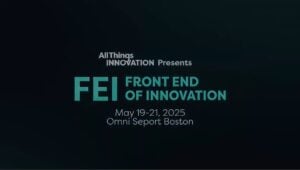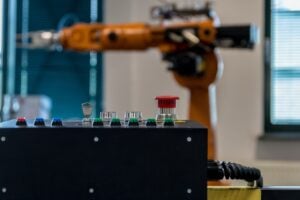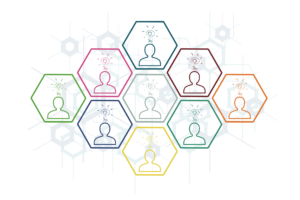“Leonardo is a think tank at the nexus of art, science, and technology,” says Rassi. “We have been around for a very long time, since the 1960s, and we’re the publishers of the first peer reviewed academic journal that brought together art, science, and technology. Today, we’re global. We have a salon series in 58 cities around the world. We publish our peer reviewed journal at MIT Press along with our book series, the Leonardo series. We have a strategic partnership with ASU, and we have several different residencies and fellowships. Our work is about incubating creativity and collaborative problem solving to address complex issues in the world.”
Speaking of an interdisciplinary and collaborative approach, we had a roundtable featured here at FEI, and it was all about the creativity of cross collaboration, of how these innovators can come together with other parts of the company. Did you have any key takeaways on what you gained from that?
“I love that we’re having this conversation. I think it’s an important one,” she says. “I also think it’s important to distinguish between capital ‘I’ innovation and lower ‘i’ innovation when we talk about this kind of approach and the way that we move forward. One of the speakers talked about kind of going rogue. That made me smile, but I also think that we need to include more stakeholders in what that means. A lot of organizations speak about innovation but want to time box it. They also want to control it. Part of innovation is about play. It comes about from unintended consequences, recognizing it and being able to capture it. I think when we talk about innovation, we really need to be more specific about what type of innovation and for what purpose.”
The Lifecycle of Innovation
“Going rogue” was an impactful comment during the FEI roundtable presentation regarding the innovation mindset and the overall culture. Is the process of innovation becoming more of a democratized system in the corporate enterprise, where everyone is involved or should be involved in the process?
“I think we go in cycles,” says Rassi. “If you think about 15 or 20 years ago, you had Starbucks come out with their idea platform where everyone across the company could give ideas and people would give thumbs up, thumbs down, how it went. I myself have rolled out a number of different organization wide innovation processes. I think the key is about really intending for the engagement to be authentic and not just for people to give ideas and never hear back. Some of the things that I have seen work well is to engage individuals whose ideas people think are good and have them have a part in the development of that idea from beginning to the end. That provides a really good way for them to grow and really allows everyone to feel like they own the innovation process versus just the ideation or just the execution. You want think about the full life cycle, I think, when you’re thinking about democratization. How can you engage everyone along the way?”
It’s not just the leadership from the top down, but also perhaps getting all of the employees involved in this more open innovation process.
Rassi observes, “It’s the stakeholder engagement that can fuel innovation, not just the leadership but also the employees, the curious, the creative, the ones that want to create and engage with innovation. We all do. I mean, I don’t think anyone owns the innovation label. We all are innovative in our own ways. And so how do we bring people together? And really for people who are lucky enough to have a leadership role in innovation, how do you take a step back and make room for other people to come in? That sometimes is very challenging. You sometimes find innovation groups becoming very insular in organizations. Being able to fight against that is kind of where you get to that democratization process.”
What is your perspective on the future of innovation?
“Uncertainty is a given,” says Rassi. “I think that we’re still trying to get our language aligned around the new tools that we have. Everyone likes to say AI. We’re talking about several different technologies and tools under that umbrella. It’s going to take a while for us to learn this new language and learn this new conversation. And I think that’s to be expected. We just are implementing a disruptive technology, so we’re going to have a little bit of time to get used to it.”
For more of the interview with Termeh Rassi, check out the video from FEI 2024.
Contributor
-

Matthew Kramer is the Digital Editor for All Things Insights & All Things Innovation. He has over 20 years of experience working in publishing and media companies, on a variety of business-to-business publications, websites and trade shows.
View all posts





























































































































































































